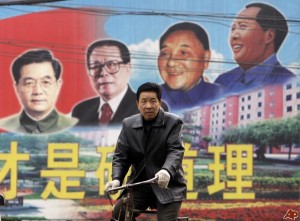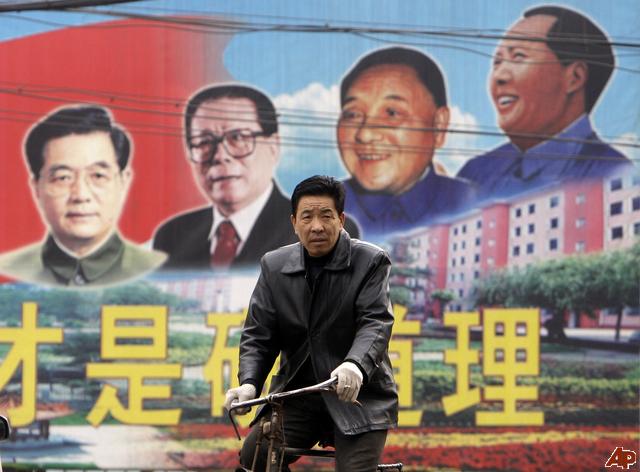China’s Leaders – Talking Politics in China – Callum Aitken

Talking politics in China has often been considered taboo in China. Certainly, in the past, speaking out against the country’s great leaders could hold serious consequences not only for the offender, but also for the offender’s family and close friends. However, visitors to China in modern times have been surprised by how openly Chinese society now discusses their leaders and politics. Care must still be taken, but, in general, China’s young people in particular are now far more open to engaging in discussions about politics and international relations – especially with foreigners.
Since the Chinese Communist Party (CCP) took power in 1949, there have been five generations of leaders – the fifth of which took power at the end of 2012. It is important to note that, across these five generations, each leader has been afforded a great deal of respect and loyalty by the Chinese people, yet this has not made them invulnerable to criticism. Indeed, China’s first leader, Mao Zedong (1949-1976), is often described as one of China’s strongest and most influential leaders, but also one that was ruthless and paranoid. The strong cult of personality surrounding him, along with his fixation on Communist ideology, was a deadly combination that lead China through two catastrophic revolutionary campaigns (the Great Leap Forward and the Cultural Revolution) which sought to modernise the country, but in fact cost millions of lives and left the country on the brink of collapse.
Nowadays, these grave mistakes are often acknowledged by China’s youth. Students I talked to commonly asserted that it was important that modern China recognised Mao Zedong’s failings, but were cautious to go too far in criticising him, stating that he still deserves a great deal of respect and admiration for his strong leadership during a testing time in China’s history. Asked if Mao was a great leader, most students would reply with a unanimous “yes”, but the question of whether he could rule effectively in modern China was met with an uncertain silence. Surprisingly, this view is one that has been supported and even promoted by the Communist since the 1980’s. Indeed, CCP officials such as Deng Xiaoping understood the inadequacies of Mao’s policies and concluded that, after the disillusionment of Mao’s last years, ideological exhortations rang hollow.
Thus, with economic reform at the heart of his new approach, Deng Xiaoping led China throughout the 80’s and early 90’s towards growth, prosperity and capitalism. As such, he is perhaps China’s most celebrated political leader amongst China’s youth today. His declaration, “To get rich is glorious” still resonates with aspiring young people across China and he is widely credited with “opening up” China to the rest of the world. Whilst students spoke with caution about Mao Zedong, they talked far more enthusiastically about Deng Xiaoping. Many could remember the day of his death in 1997, when all TV broadcasting ceased and many mourned in the streets. This is a man who inspired a nation and dragged China from hardship to modernity in just a few decades.
Yet, since Deng’s death in 1997, it is clear that there has been a conscious attempt to move away from one single charismatic leader towards more collective leadership. The fourth generation of leaders – installed after Jiang Zemin had spent just five years at the top between 1997-2002 – reflects this, with Hu Jintao and Wen Jiabao sharing domestic and international political responsibilities between 2002-2012. In my travels, students were often keen to share their thoughts on the (then) current leadership and offered their views on how they interacted with other world leaders. In this sense, Hu was often criticised by students as being “too stern” when standing alongside the beaming faces of the likes of Barack Obama. “He should smile more” was the simple criticism of many students I spoke to. Wen Jiabao, on the other hand, was granted the nickname ‘Grandpa Wen’ due to his compassionate efforts to rally support for the survivors of the Sichaun earthquake in 2008. He was clearly a favourite of students I talked to and his contrast with the hard-hearted Hu Jintao came off as a rather official “good cop bad cop” routine.
It is interesting to speculate, therefore, how China’s Fifth Generation of leaders shall be assessed and characterised in China. As in any leadership transition, there has been an air of optimism surrounding the appointment of Xi Jinping, (likened to a “friendly-looking Mao”) with many believing he is a strong enough leader to help China to continue moving forward. With this in mind, Xi and Premier Li Keqiang must take a strong stance against corruption (which plagues both politics and economics in China) and tackle growing unemployment and inequalities in Chinese society in order to live up to this image.
Overall, talking politics is perhaps not as taboo as many think. Students are often keen to share their thoughts on their leaders either in front of classmates or in private. There are, however, topics that should clearly be avoided. For instance, many students know very little about the Tiananmen Square Incident in 1989 and those that do know will not want to mention it for fear of repercussions. Similarly, there is a clear understanding amongst China’s youth that Western democratic political rights are still denied in China. Again, it would be wise to sidestep any talk of democratisation or voting, as this might be perceived as gloating or a dig at Chinese society. Apart from this, sharing stories about differences in culture, politics and should form a rather fascinating and, at times, amusing part of your journey to China – so long as certain boundaries are not crossed!
By Callum Aitken, summer teacher in Shaoxing (summer 2012)


Leave A Comment
You must be logged in to post a comment.